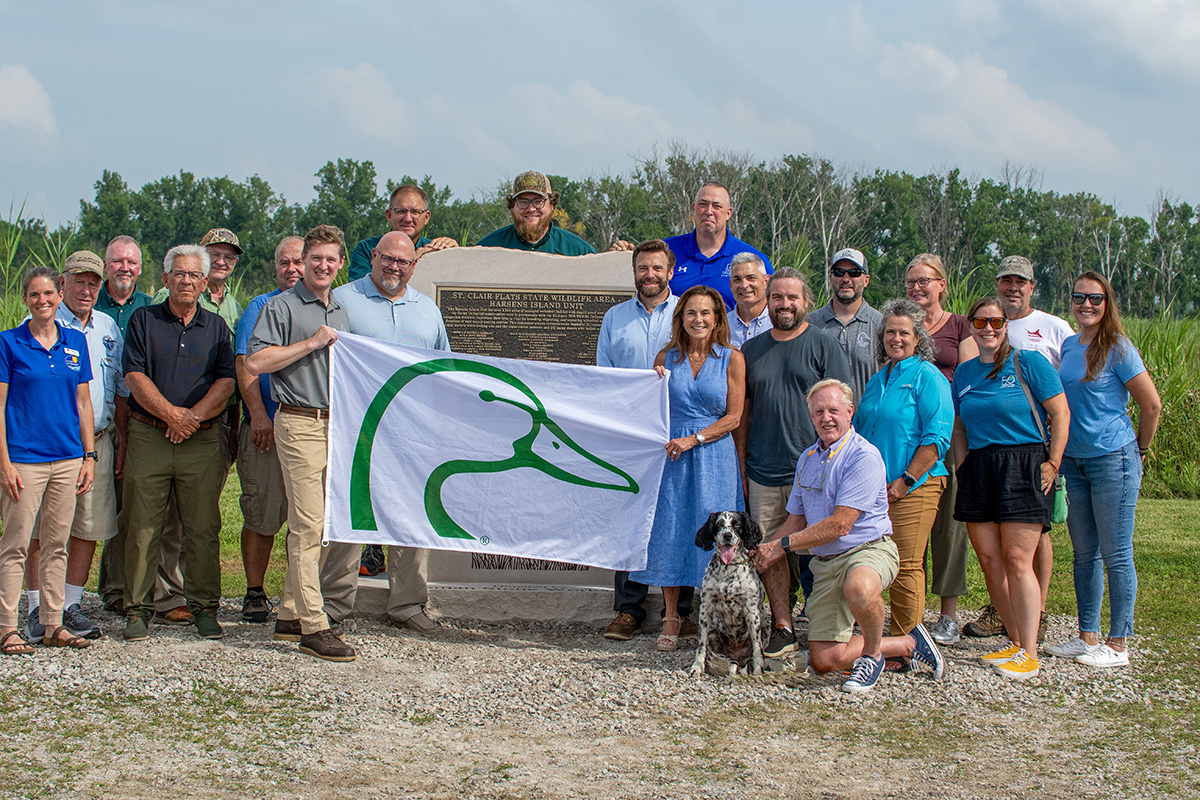U.S. Rep. Lisa C. McClain Tours Ducks Unlimited Conservation Projects at Harsens Island
Federal funding from NAWCA and GLRI has been critical to the restoration work at St. Clair Wildlife Area
Federal funding from NAWCA and GLRI has been critical to the restoration work at St. Clair Wildlife Area

House Republican Conference Chairwoman Lisa McClain (right) holds up the DU flag with DU Director of Public Policy, Kyle Rorah.
House Republican Conference Chairwoman Lisa McClain joined Ducks Unlimited (DU) and the Michigan Department of Natural Resources (MDNR) on Friday to tour Harsens Island Managed Waterfowl Area. DU and the MDNR have been conservation partners for decades, working to restore public wetlands across the state. Since 1984, DU has conserved nearly 80,000 acres in Michigan, spending more than $53 million on habitat restoration.
MDNR manages Harsens Island, which is located on the shores of the St. Clair Flats. The 3,355 acres of managed habitat are part of the largest freshwater delta in the U.S. Mallards are the most prevalent waterfowl species at Harsens Island, but black ducks, pintails, wood ducks, and Canada geese are also prevalent. The unit supports between 6,000 to 8,000 duck hunter trips per year, and 1,500 to 1,800 individual duck hunters will hunt Harsens Island during the 60-day season.
Much of the recent restoration at Harsens Island has been federally funded by the North American Wetlands Conservation Act (NAWCA) and the Great Lakes Restoration Initiative (GLRI). Significant projects include Krispin Drain, the primary source of water for the units at Harsens Island, two pump stations that can support the entire managed area, restoration of more than 1,300 acres between the West and East Marshes, and treating or removing over 2,000 acres of invasive phragmites.
“Thank you to Rep. McClain for taking the time to tour Harsens Island and see firsthand the importance of federal conservation funding to habitat delivery,” said DU CEO Adam Putnam. “The Congresswoman has strongly advocated for Ducks Unlimited’s mission to protect North America's waterfowl and wetlands. Michigan’s St. Clair Flats remain a critical stopover point for migratory birds, and the conservation of Harsens Island will improve drinking water quality and provide economic value to local businesses and residents of southeast Michigan.”
In early July, the U.S. House of Representatives unanimously passed HR 2316, the Wetlands Conservation & Access Improvement Act, led by Rep. Jeff Hurd (CO) and Sarah Elfreth (MD). The bill ensures that the interest generated by the Pittman-Robertson Act will continue to be invested in NAWCA. The House also recently released the Department of the Interior appropriations bill, which, if passed, would maintain strong funding for NAWCA and GLRI.
“The Great Lakes are the largest freshwater system in the world, supplying drinking water to 30 million Americans,” Chairwoman McClain said. “The conservation work being done by Ducks Unlimited and the Michigan Department of Natural Resources is essential to making these waters safe for recreation and the wildlife that rely on the Great Lakes for survival. I will continue to do all I can to protect one of America’s most valuable natural resources.”
NAWCA was enacted over 30 years ago to provide federal cost-share funding to support the North American Waterfowl Management Plan. This international agreement offers a strategy for protecting wetlands and associated upland habitats needed by North American waterfowl and other migratory birds. Since its inception, $4.1 billion has been spent on more than 3,300 NAWCA projects, contributing to the conservation of almost 32 million acres.
The first GLRI action plan was implemented in 2010 to protect and restore the Great Lakes. The initiative has received $4.9 billion, funding more than 8,100 restoration projects—many of which take place in our national parks. These projects aim to clean up pollution, improve water quality, restore native habitat, and combat invasive species.
“Ducks Unlimited could not restore the tens of thousands of acres it has in the state of Michigan without federally funded programs like NAWCA and GLRI,” said DU director of policy Kyle Rorah. “We appreciate the support of Rep. McClain and her willingness to come and see the importance of wetland projects, like Harsens Island, to the future of waterfowl conservation.”
Media Contact:
Joe Genzel
(309) 453-0979
jgenzel@ducks.org
Ducks Unlimited uses cookies to enhance your browsing experience, optimize site functionality, analyze traffic, and deliver personalized advertising through third parties. By continuing to use this site, you agree to our use of cookies. View Privacy Policy